
27 Sep 2019 | Non categorizzato
Twelve songs which are part of the history of this music group become a collection, taken from their world tour “Life”, a tour that will continue in the coming months. Among their plans for the future Gen Rosso will also be involved with delivering courses, educational projects, co-productions and the third edition of “Gen Rosso Music and Arts Village”. 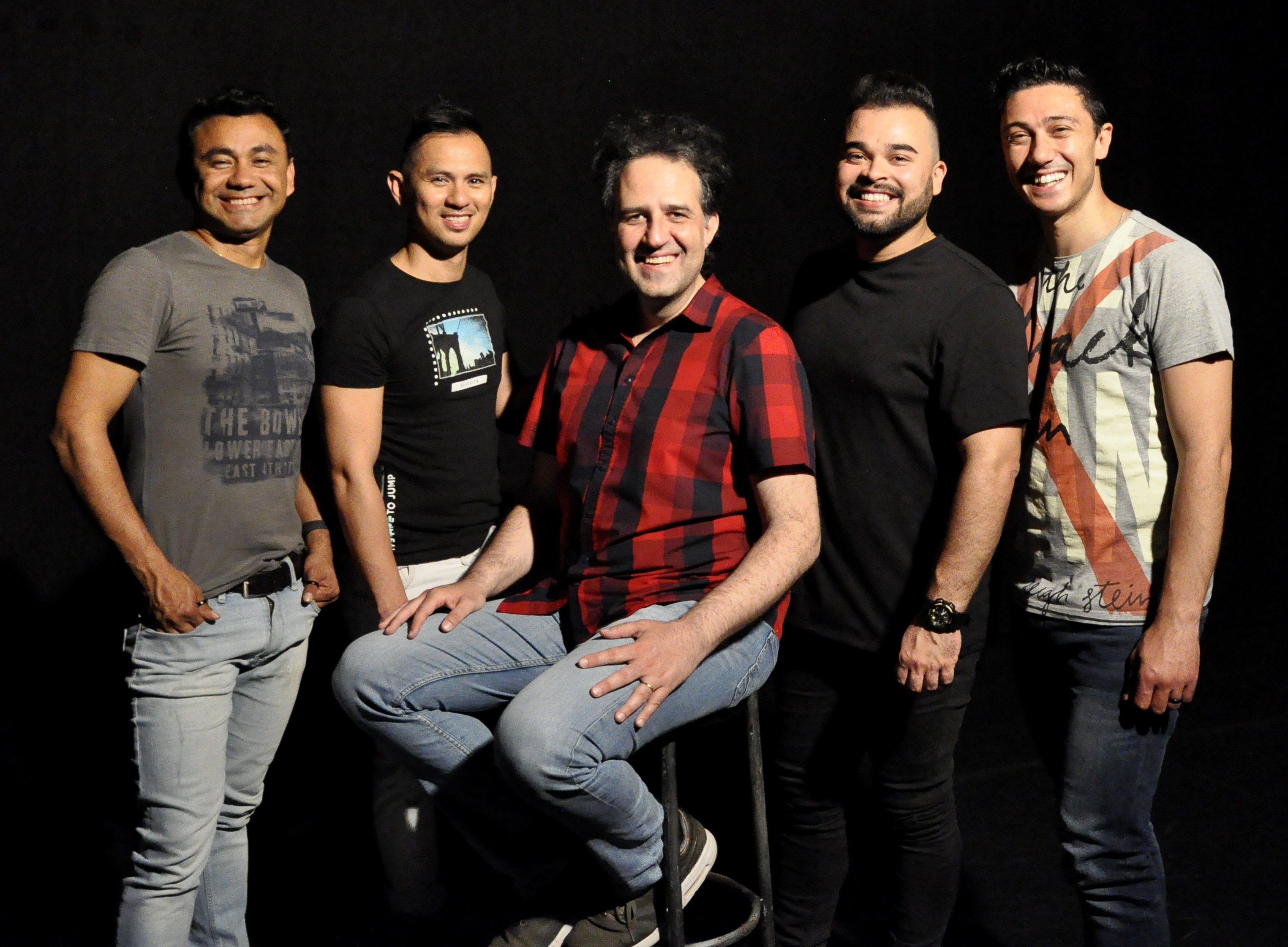 After more than fifty years of life theirs is an artistic proposition capable of continuous renewal. At the same time, they keep the compass fixed on some key points: a life lived under the banner of fraternity, a collaborative production between artists of various nationalities that speaks of unity between peoples and nations, a message that proposes a culture of giving and sharing – attentive to the challenges of our planet. This is Gen Rosso an international music group, made up of musicians and technicians of different vocations from Europe, Asia and Latin America. Recently their “Life” tour became an album with eighteen tracks chosen from the songs recorded by Gen Rosso over the years. We talk about it with one of the group, Michele Sole. – On July 1st your live album from the “LIFE” Tour was released. How was this new album conceived and what are its characteristics? From the autumn of 2018 until today we have had some beautiful concerts all over Italy with our production “LIFE” and since the audiences were enthusiastic, like we were ourselves, from there we had the desire to create a cd ‘Life – live’. Once the recordings made on stage were re-created, we mixed them trying to keep all the energy and emotion that we breathe in our concerts. You can hear the audience singing with us, their applause and their voices, giving the listener the feeling of being right there with us on stage. In short, a real live recording! –
After more than fifty years of life theirs is an artistic proposition capable of continuous renewal. At the same time, they keep the compass fixed on some key points: a life lived under the banner of fraternity, a collaborative production between artists of various nationalities that speaks of unity between peoples and nations, a message that proposes a culture of giving and sharing – attentive to the challenges of our planet. This is Gen Rosso an international music group, made up of musicians and technicians of different vocations from Europe, Asia and Latin America. Recently their “Life” tour became an album with eighteen tracks chosen from the songs recorded by Gen Rosso over the years. We talk about it with one of the group, Michele Sole. – On July 1st your live album from the “LIFE” Tour was released. How was this new album conceived and what are its characteristics? From the autumn of 2018 until today we have had some beautiful concerts all over Italy with our production “LIFE” and since the audiences were enthusiastic, like we were ourselves, from there we had the desire to create a cd ‘Life – live’. Once the recordings made on stage were re-created, we mixed them trying to keep all the energy and emotion that we breathe in our concerts. You can hear the audience singing with us, their applause and their voices, giving the listener the feeling of being right there with us on stage. In short, a real live recording! – 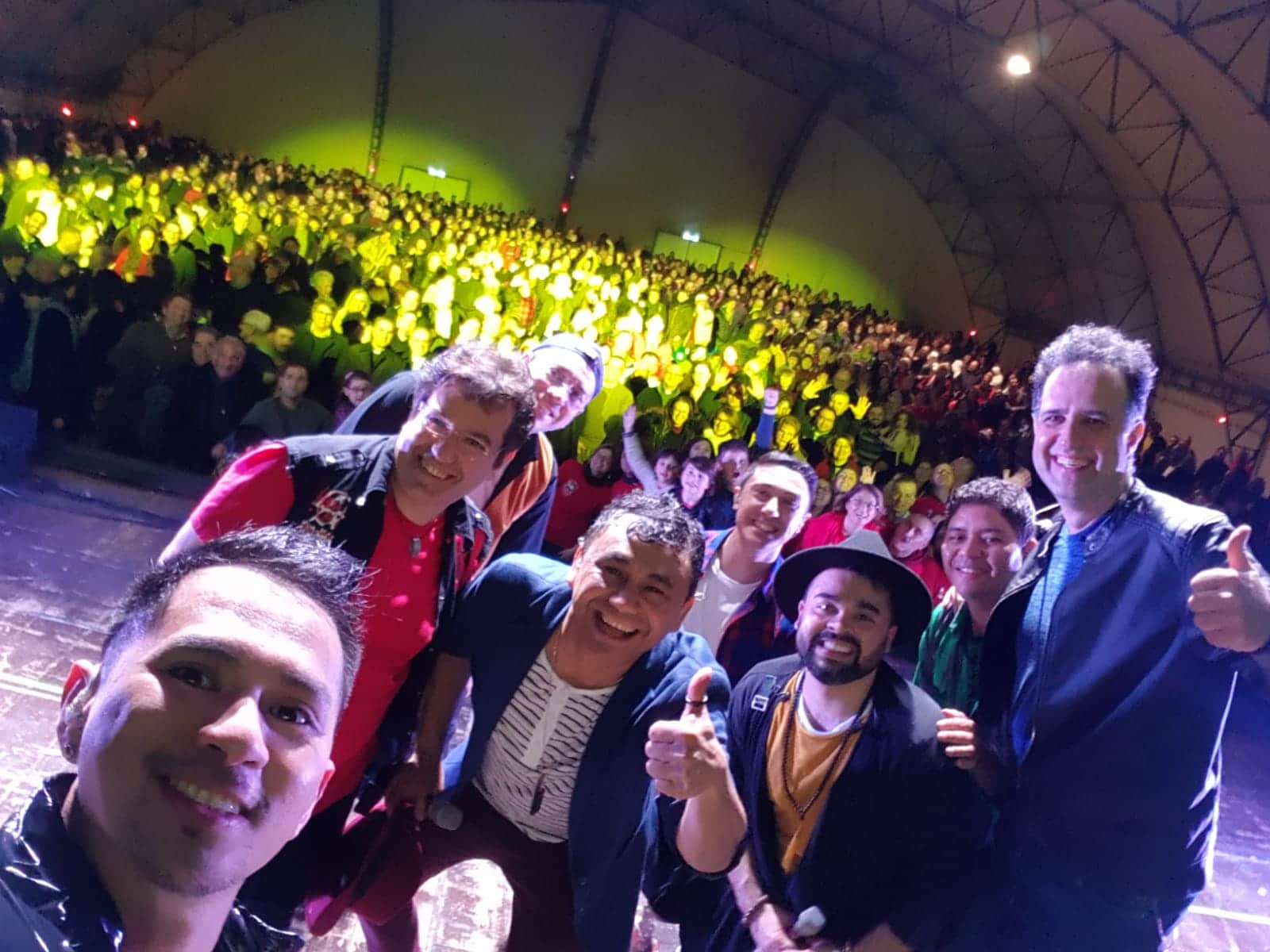 Recently you have created, in the international little town of Loppiano where you are based the “Gen Rosso Music and Arts Village”. What is this and what are the objectives? The “Gen Rosso Music and Arts Village” will be held this year from December 27th 2019 until January 5th 2020, this will be the third edition. It is an artistic experience, the sharing of values from the perspective of the charism of unity. It involves young professionals and students, aged 18 and above, from different disciplines such as music, dance, singing, theatre. The teaching methodology is designed by Gen Rosso tutors together with teachers who have recognized artistic skills and experience. The program includes an in-depth study of specific themes from the art world, the exchange of experiences, creative spaces and practical workshops that will converge in a final performance. You can register at village@genrosso.com. The programme will start on December 27th 2019 and will end on January 5th 2020.
Recently you have created, in the international little town of Loppiano where you are based the “Gen Rosso Music and Arts Village”. What is this and what are the objectives? The “Gen Rosso Music and Arts Village” will be held this year from December 27th 2019 until January 5th 2020, this will be the third edition. It is an artistic experience, the sharing of values from the perspective of the charism of unity. It involves young professionals and students, aged 18 and above, from different disciplines such as music, dance, singing, theatre. The teaching methodology is designed by Gen Rosso tutors together with teachers who have recognized artistic skills and experience. The program includes an in-depth study of specific themes from the art world, the exchange of experiences, creative spaces and practical workshops that will converge in a final performance. You can register at village@genrosso.com. The programme will start on December 27th 2019 and will end on January 5th 2020. 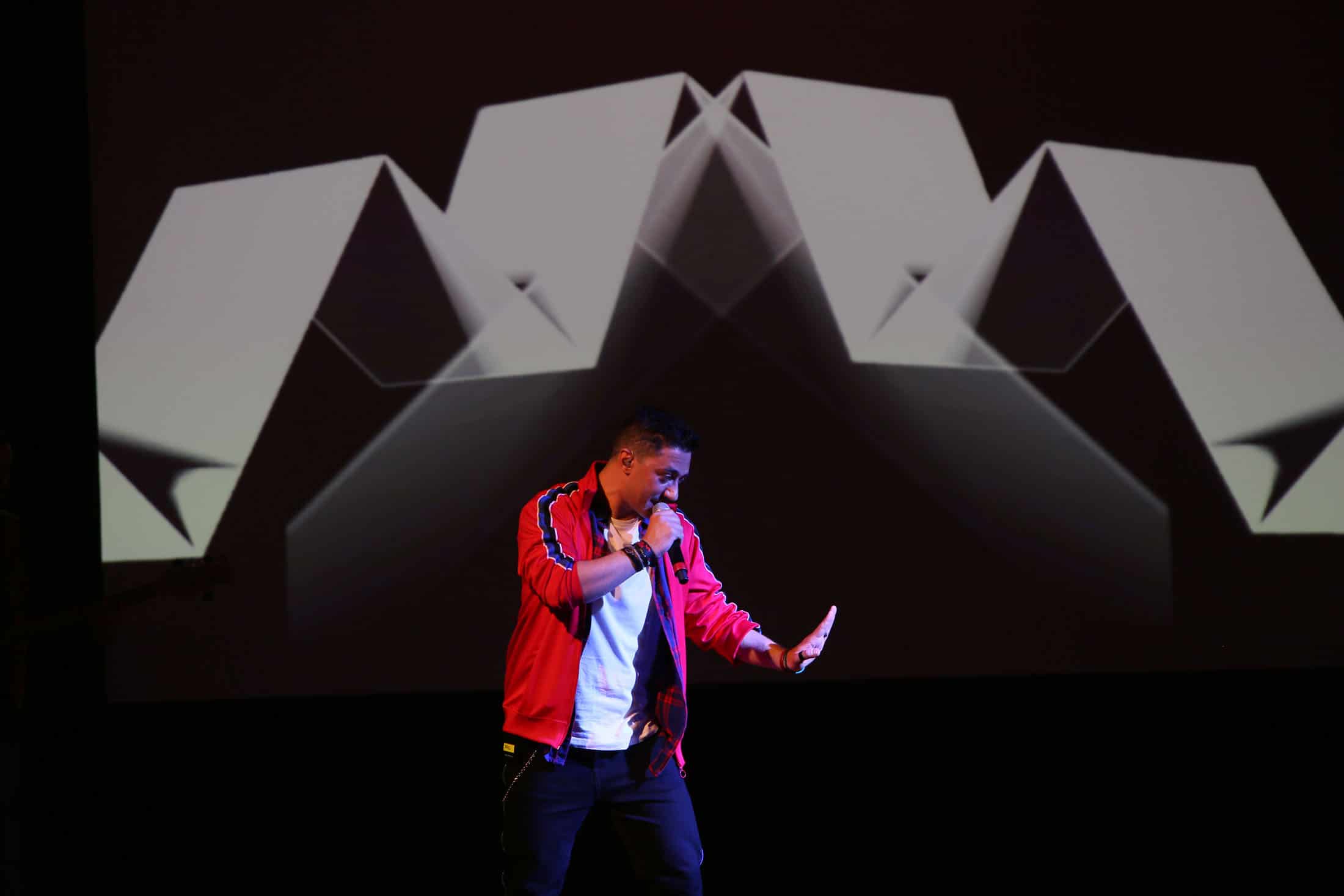 – In your travels, you participate in events that promote peace and friendship between peoples and universal fraternity. Is there a recent one that you remember in particular and why? Yes, in the spring we had the joy of being in Jordan, thanks to “Caritas Jordan”, to carry out the project “Be the change” . We worked with hundreds of students from different social classes, different religions and different nationalities, It is a project to foster dialogue and promote a culture of peace and friendship, with the participants themselves being the promoters of a change in their lives and in their cities for a better future. – What are your plans and future appointments? First of all, we will resume the world tour with the concert “Life” along with educational projects and the inclusion on stage of young people prepared during various workshops. The tour will begin in Italy (September 28th in Venosa; October 12th in Piacenza; October 23rd and 24th in Acerra; October 26th in Prato, November 1st in Teano). Then an Asian tour in Indonesia for almost the entire month of November 2019.
– In your travels, you participate in events that promote peace and friendship between peoples and universal fraternity. Is there a recent one that you remember in particular and why? Yes, in the spring we had the joy of being in Jordan, thanks to “Caritas Jordan”, to carry out the project “Be the change” . We worked with hundreds of students from different social classes, different religions and different nationalities, It is a project to foster dialogue and promote a culture of peace and friendship, with the participants themselves being the promoters of a change in their lives and in their cities for a better future. – What are your plans and future appointments? First of all, we will resume the world tour with the concert “Life” along with educational projects and the inclusion on stage of young people prepared during various workshops. The tour will begin in Italy (September 28th in Venosa; October 12th in Piacenza; October 23rd and 24th in Acerra; October 26th in Prato, November 1st in Teano). Then an Asian tour in Indonesia for almost the entire month of November 2019. 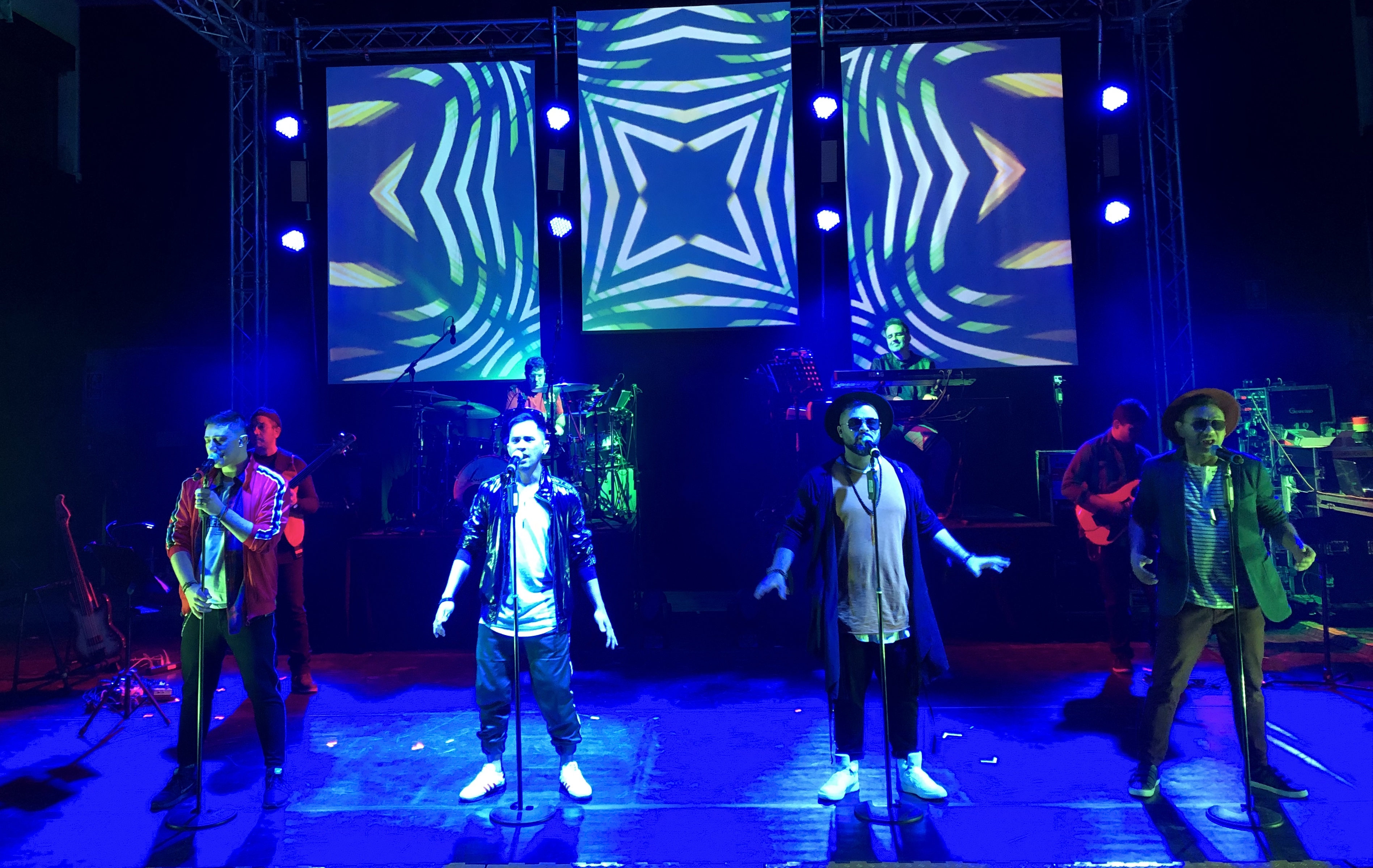 Meanwhile, we will continue with courses in the little town of Loppiano, sharing experiences, training and art. From October 15th to 17th we will examine in depth light design, a course intended for people interested in expanding their knowledge of the use of light and colour. In addition, to support young emerging artists, we have started co-productions. The first is Stabat in Silentium, the staging of a play by the young writer Francesco Bertolini. This play is the result of a profound experience of solidarity that emerged after the earthquake in Amatrice (Italy). “How can one still believe in God after an earthquake?” is the “uncomfortable” question which is the starting point of this work. The protagonists are the young victims, but also the volunteers who leave their quiet life to go where tragedy has occurred.
Meanwhile, we will continue with courses in the little town of Loppiano, sharing experiences, training and art. From October 15th to 17th we will examine in depth light design, a course intended for people interested in expanding their knowledge of the use of light and colour. In addition, to support young emerging artists, we have started co-productions. The first is Stabat in Silentium, the staging of a play by the young writer Francesco Bertolini. This play is the result of a profound experience of solidarity that emerged after the earthquake in Amatrice (Italy). “How can one still believe in God after an earthquake?” is the “uncomfortable” question which is the starting point of this work. The protagonists are the young victims, but also the volunteers who leave their quiet life to go where tragedy has occurred.
Anna Lisa Innocenti
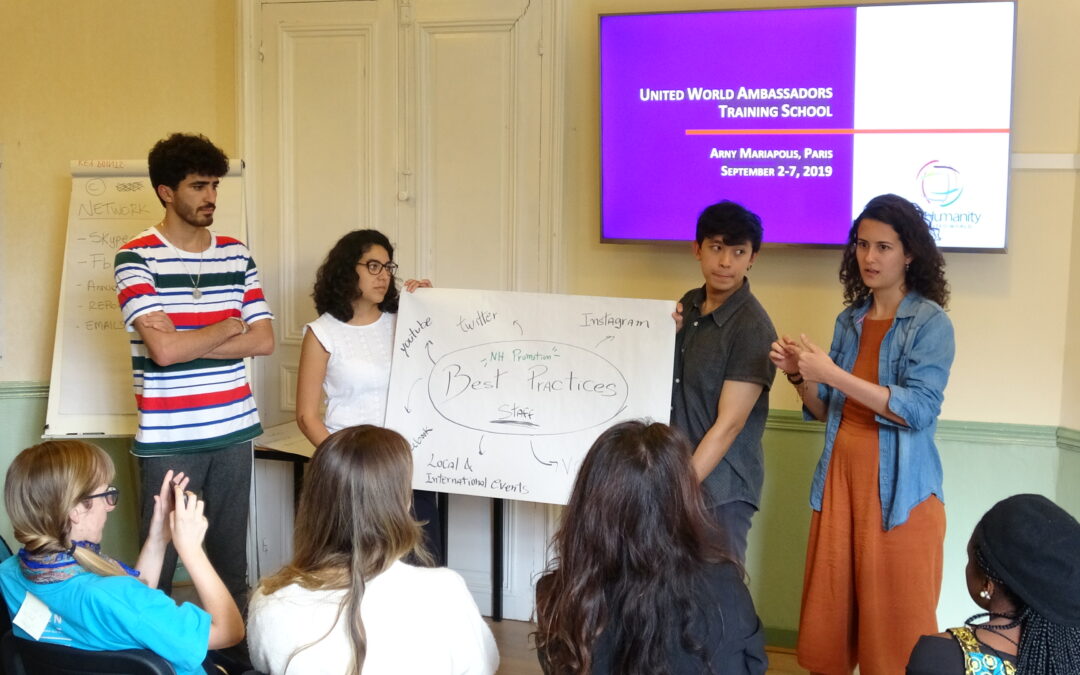
25 Sep 2019 | Non categorizzato
At the Mariapolis in Arny, 35km south of Paris, the first “Ambassadors of a United World” course was held from 2–7 September. There were 16 young people from 14 countries who participated. 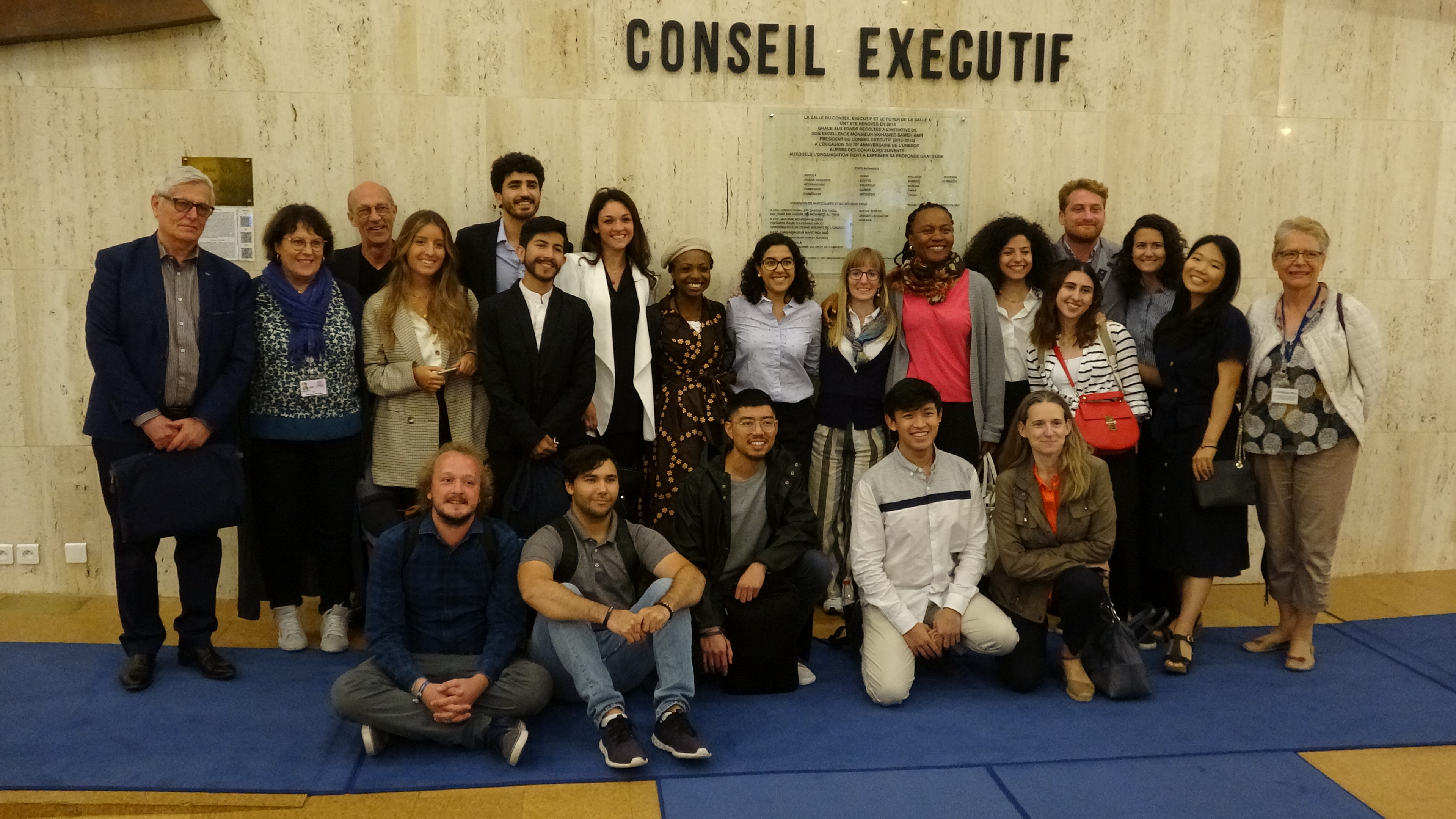 “Better Together” was the catchphrase that guided them. The programme was sponsored by New Humanity, an international non-profit organisation, which is an offshoot of the Focolare Movement and takes its inspiration from the spirit and values behind it. The goal was to strengthen the expertise of a group of young change makers, peace builders and community leaders, training them in the culture of unity, peace and fraternity, in order for them to become true “ambassadors” of a united world, capable of being spokespeople for the NGO nationally and internationally. The 16 who participated were from Belgium, Brazil, Cameroon, Colombia, South Korea, Ecuador, the Philippines, Kenya, Iraq, Italy, Lebanon, Mexico, Nigeria, Spain and the U.S. “This was New Humanity’s first training course,” said Chantal Grevin, New Humanity’s main delegate at UNESCO in Paris. “It was an effective experience that allowed us, in just one week, to give them the necessary skills to become active workers in our NGO.”
“Better Together” was the catchphrase that guided them. The programme was sponsored by New Humanity, an international non-profit organisation, which is an offshoot of the Focolare Movement and takes its inspiration from the spirit and values behind it. The goal was to strengthen the expertise of a group of young change makers, peace builders and community leaders, training them in the culture of unity, peace and fraternity, in order for them to become true “ambassadors” of a united world, capable of being spokespeople for the NGO nationally and internationally. The 16 who participated were from Belgium, Brazil, Cameroon, Colombia, South Korea, Ecuador, the Philippines, Kenya, Iraq, Italy, Lebanon, Mexico, Nigeria, Spain and the U.S. “This was New Humanity’s first training course,” said Chantal Grevin, New Humanity’s main delegate at UNESCO in Paris. “It was an effective experience that allowed us, in just one week, to give them the necessary skills to become active workers in our NGO.” 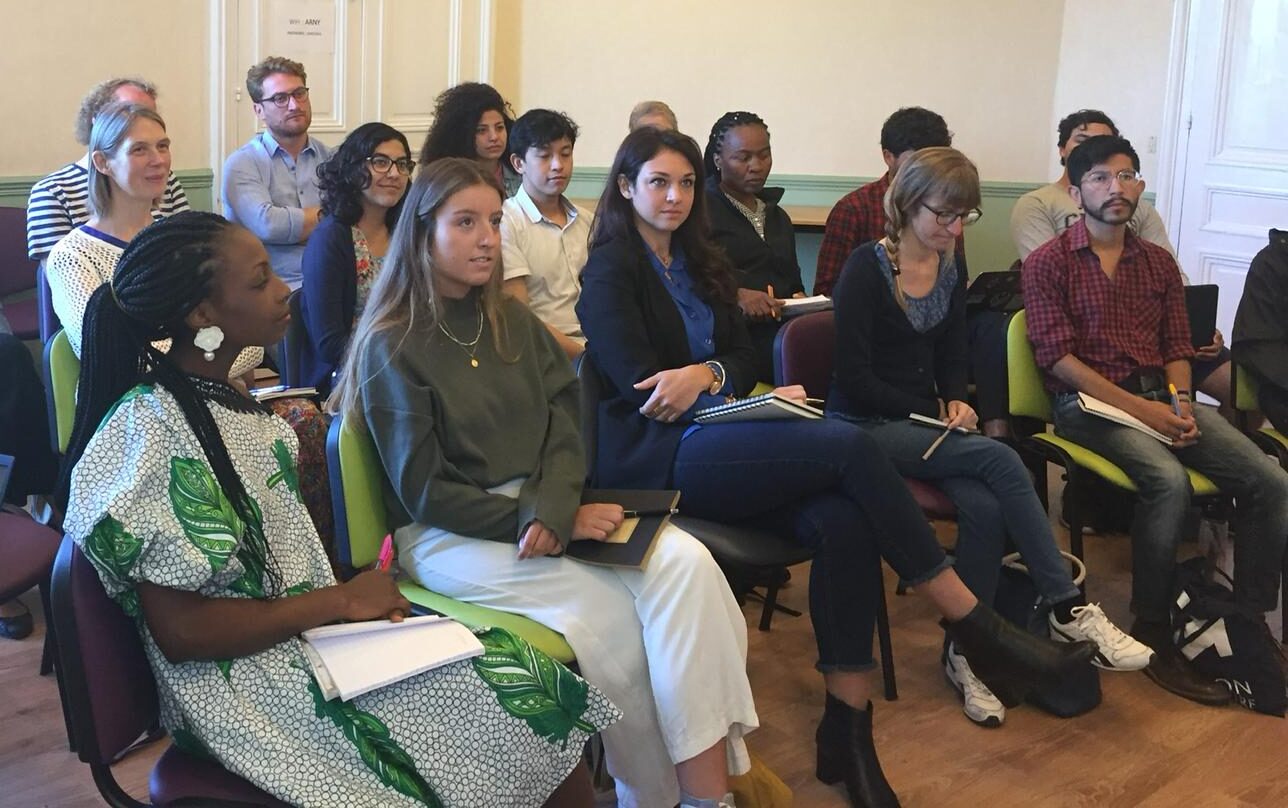 “We talked about what we mean by a ‘united world’, what peace, human rights are, and as a result what we mean by ‘person’”, explained Marco Desalvo, the NGO’s president. “We made an effort to translate all the best practices that our young people promote each day in the world, into a language that can inspire the international institutions, to spread the spirit of universal fraternity in every area of society at every level, just as the Universal Declaration of Human Rights proclaims.” The young ambassadors were welcomed by UNESCO officials from the humanities and social sciences (youth branch) and the education sector (global citizenship and culture of peace). “An open and free dialogue sprang up, allowing these delegates to discover New Humanity’s activities in a better way, through experiences from the young ambassadors, who were able to act as one, seeing all they had learned in recent days and their positive experiences of global citizenship,” added Grevin. Each young person was given the possibility of personally meeting the UNESCO delegate from their country and express their vision regarding the huge challenges of peace, the environment and fraternity.
“We talked about what we mean by a ‘united world’, what peace, human rights are, and as a result what we mean by ‘person’”, explained Marco Desalvo, the NGO’s president. “We made an effort to translate all the best practices that our young people promote each day in the world, into a language that can inspire the international institutions, to spread the spirit of universal fraternity in every area of society at every level, just as the Universal Declaration of Human Rights proclaims.” The young ambassadors were welcomed by UNESCO officials from the humanities and social sciences (youth branch) and the education sector (global citizenship and culture of peace). “An open and free dialogue sprang up, allowing these delegates to discover New Humanity’s activities in a better way, through experiences from the young ambassadors, who were able to act as one, seeing all they had learned in recent days and their positive experiences of global citizenship,” added Grevin. Each young person was given the possibility of personally meeting the UNESCO delegate from their country and express their vision regarding the huge challenges of peace, the environment and fraternity. 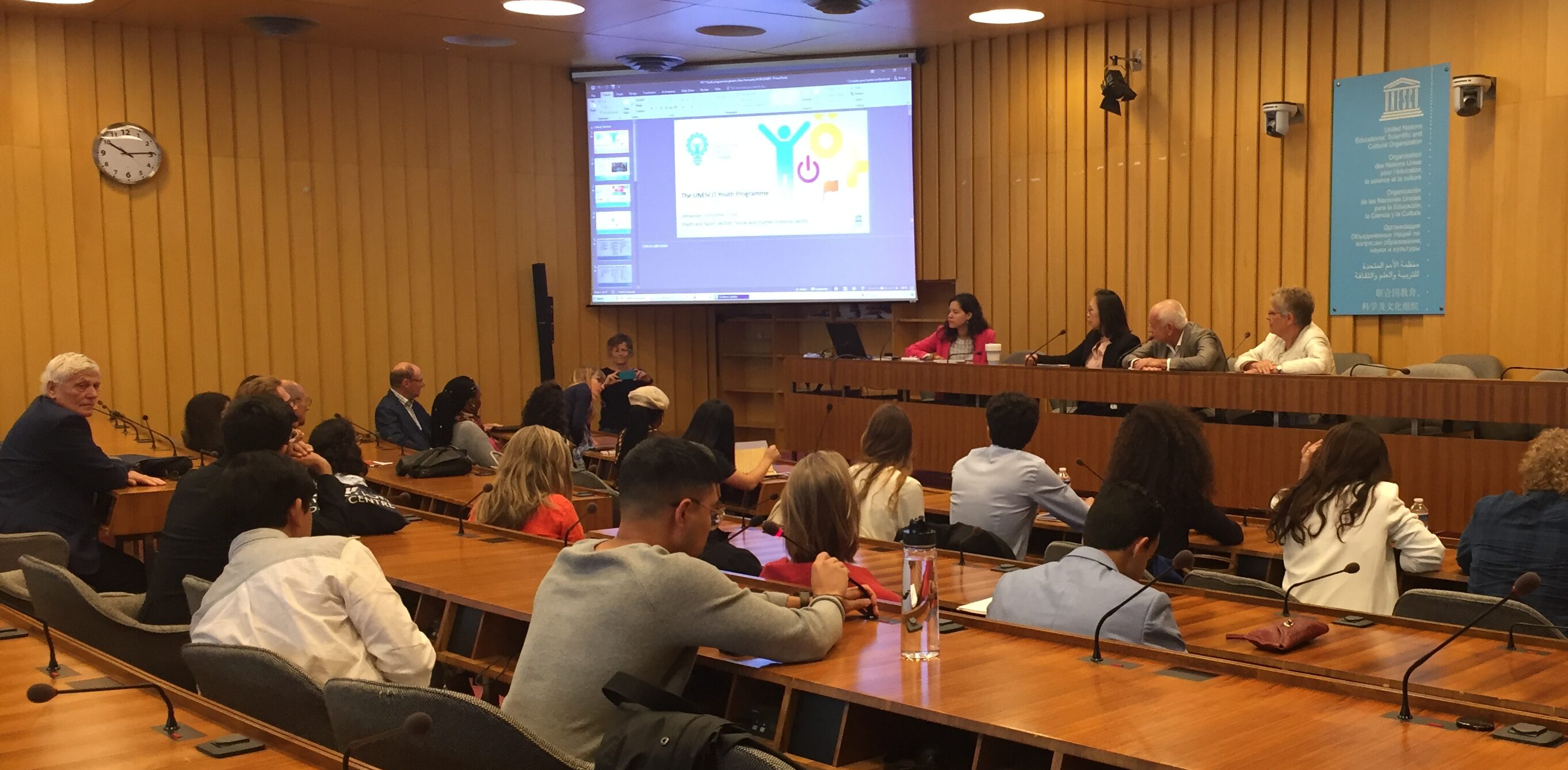 During the training course, the young people also had the opportunity to meet and speak with Monsignor Follo, a permanent observer to the Holy See, and Marie Claude Machon, Philippe Beaussant and Patrick Gallaud, who are the president, vice president and ex-president respectively of the liaison committee between NGOs and UNESCO. “Thanks to this course I learned so much about the United Nations system and NGO activities worldwide”, said Luciana, an Italian lawyer, at the conclusion of the experience. “Yet above all I rediscovered the true motivators that drove me towards this world. As an ambassador of New Humanity, I would like to promote the idea that supporting each other can make a great difference in creating a more united world. I understood that small
During the training course, the young people also had the opportunity to meet and speak with Monsignor Follo, a permanent observer to the Holy See, and Marie Claude Machon, Philippe Beaussant and Patrick Gallaud, who are the president, vice president and ex-president respectively of the liaison committee between NGOs and UNESCO. “Thanks to this course I learned so much about the United Nations system and NGO activities worldwide”, said Luciana, an Italian lawyer, at the conclusion of the experience. “Yet above all I rediscovered the true motivators that drove me towards this world. As an ambassador of New Humanity, I would like to promote the idea that supporting each other can make a great difference in creating a more united world. I understood that small 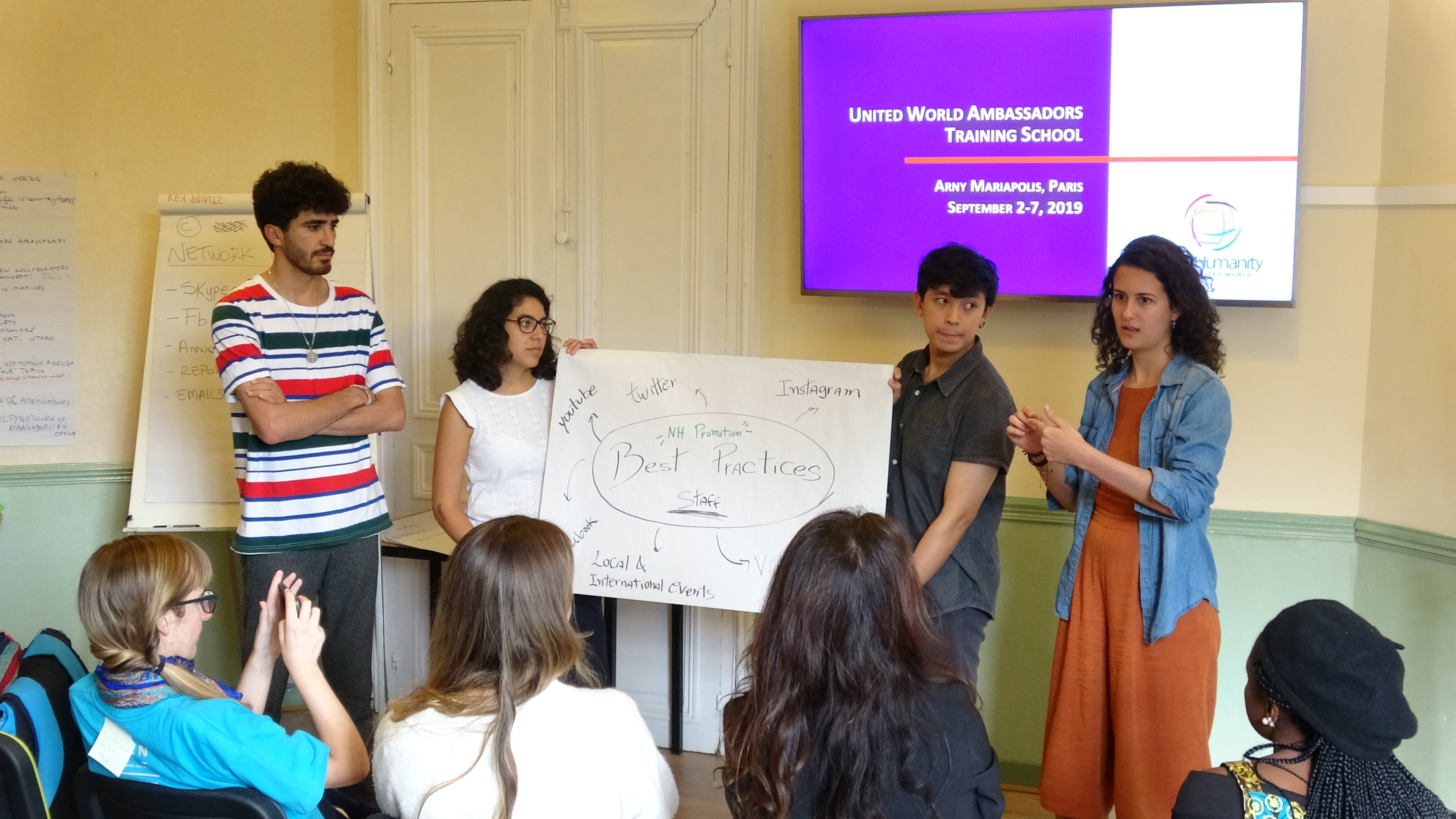 gestures can have a great impact on people’s wellbeing. This is why I feel so privileged to be a part of this fantastic project!” Pascal, who is Lebanese, shared: “When I first arrived, I was discouraged at not being able to find solutions for my own country. Then I found courage and hope, and I understood that we can persevere, we can truly work to reach a united world. I know it will happen! I am quite happy to be going back to my country and start working.” And Noè, from Mexico, said: “I arrived here with my friend Josef from the U.S. We live just a few kilometres from the border separating our countries. We are already working together on projects to help migrants. When we go back, we’ll be able to put into practice what we learned here.”
gestures can have a great impact on people’s wellbeing. This is why I feel so privileged to be a part of this fantastic project!” Pascal, who is Lebanese, shared: “When I first arrived, I was discouraged at not being able to find solutions for my own country. Then I found courage and hope, and I understood that we can persevere, we can truly work to reach a united world. I know it will happen! I am quite happy to be going back to my country and start working.” And Noè, from Mexico, said: “I arrived here with my friend Josef from the U.S. We live just a few kilometres from the border separating our countries. We are already working together on projects to help migrants. When we go back, we’ll be able to put into practice what we learned here.”
Tamara Pastorelli
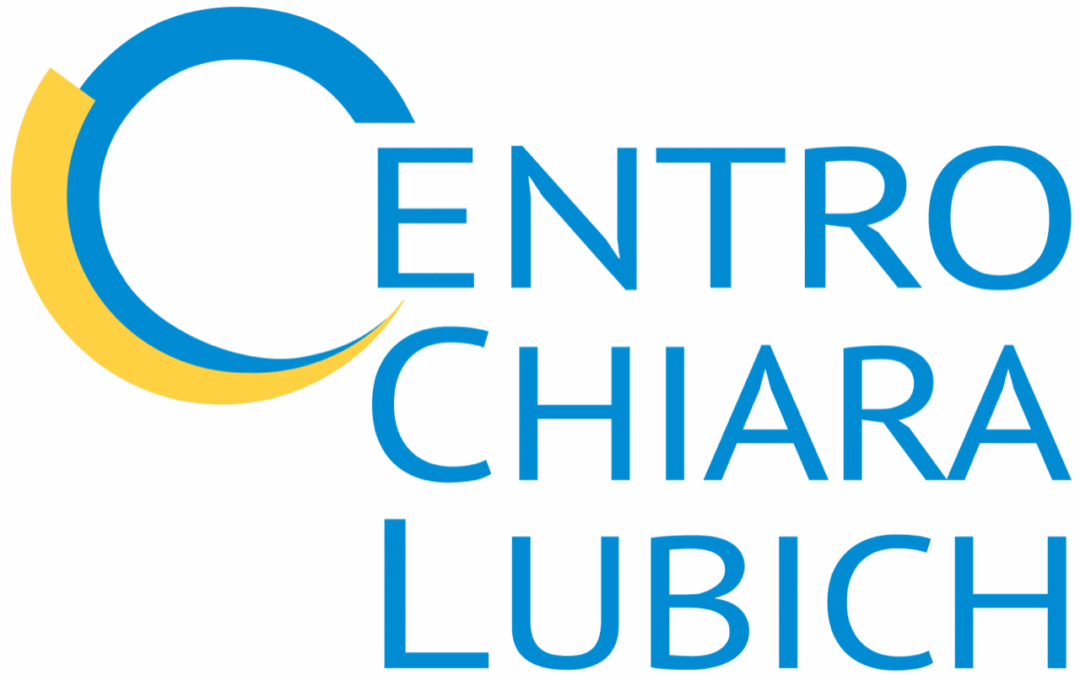
23 Sep 2019 | Non categorizzato
In order to commemorate the centenary of Chiara Lubich’s birth, students have been offered an initial opportunity to deepen her thought in the light of national and international events which characterized the history of the twentieth century. 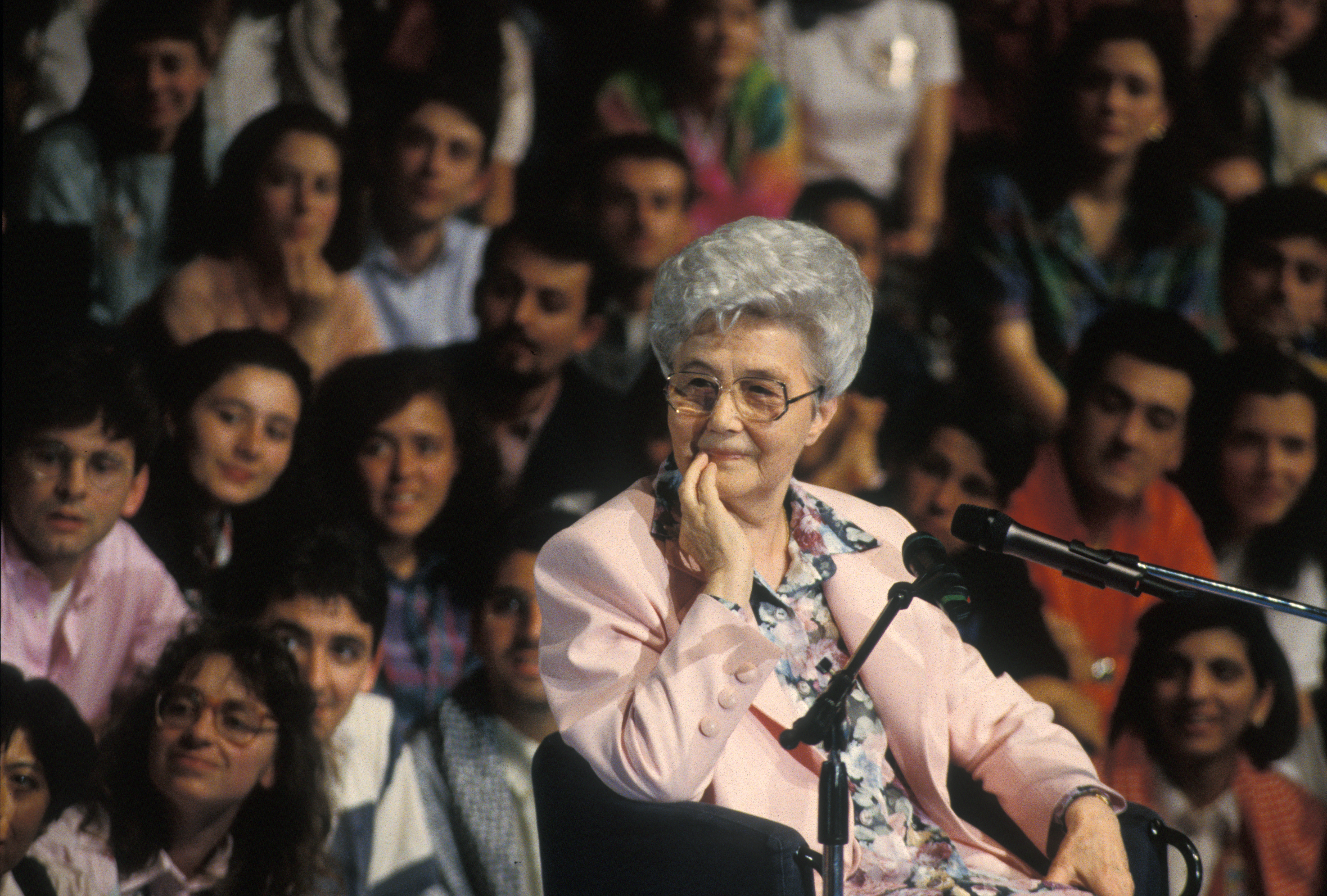 The Ministry of Education, University and Research (Italy) announced the national competition, open to Junior and Senior High Schools, on their website https://www.miur.gov.it/competizioni-e-concorsi-per-studenti highlighting the theme: “One city is not enough”. Chiara Lubich, Citizen of the World To discover her illustrious figure, her commitment and life witness on the occasion of the CENTENARY OF HER BIRTH with the aim of building Unity and Fraternity among peoples The competition is being promoted by the Chiara Lubich/New Humanity Centre and by the Trentino Historical Museum Foundation, in collaboration with the Ministry of Education, University Studies & Research, as part of the centenary celebrations of Chiara Lubich’s birth. Who is it for? It is aimed at students of all Italian junior and senior high schools whose participation consists of writing a paper (in the form of written text or a multimedia presentation) on one of the following topics: – Chiara Lubich in the context of the Second World War – Chiara Lubich and the collapse of the Berlin Wall – Chiara Lubich “Citizen of the World”, in dialogue with peoples and cultures In addition – and this is the fourth thematic area – students can narrate positive experiences they have personally lived, thus documenting chronicles that are of a positive nature, inspired by the message conveyed by Lubich’s writings. What are the aims of the competition? The competition aims to develop a spirit of initiative by creating situations of didactic conflict by writers still unexplored by standard textbooks; it aims to make Chiara Lubich known as a significant protagonist of the twentieth century through a profound understanding of her vision of “a united world”; it also aims to accompany new generations in their active pursuit of paths of peace and brotherhood between different cultures, languages, religions and peoples.
The Ministry of Education, University and Research (Italy) announced the national competition, open to Junior and Senior High Schools, on their website https://www.miur.gov.it/competizioni-e-concorsi-per-studenti highlighting the theme: “One city is not enough”. Chiara Lubich, Citizen of the World To discover her illustrious figure, her commitment and life witness on the occasion of the CENTENARY OF HER BIRTH with the aim of building Unity and Fraternity among peoples The competition is being promoted by the Chiara Lubich/New Humanity Centre and by the Trentino Historical Museum Foundation, in collaboration with the Ministry of Education, University Studies & Research, as part of the centenary celebrations of Chiara Lubich’s birth. Who is it for? It is aimed at students of all Italian junior and senior high schools whose participation consists of writing a paper (in the form of written text or a multimedia presentation) on one of the following topics: – Chiara Lubich in the context of the Second World War – Chiara Lubich and the collapse of the Berlin Wall – Chiara Lubich “Citizen of the World”, in dialogue with peoples and cultures In addition – and this is the fourth thematic area – students can narrate positive experiences they have personally lived, thus documenting chronicles that are of a positive nature, inspired by the message conveyed by Lubich’s writings. What are the aims of the competition? The competition aims to develop a spirit of initiative by creating situations of didactic conflict by writers still unexplored by standard textbooks; it aims to make Chiara Lubich known as a significant protagonist of the twentieth century through a profound understanding of her vision of “a united world”; it also aims to accompany new generations in their active pursuit of paths of peace and brotherhood between different cultures, languages, religions and peoples.  What resources are available to discuss the proposed topics? Chiara Lubich is quite a well-known figure, however, both teachers and students are free to contact the Chiara Lubich Centre by leaving a message on their website or by writing to: concorso.studenti@centrochiaralubich.org The Trentino Historical Museum Foundation will also inaugurate an international multimedia exhibition entitled “Chiara Lubich World City” (opening from 7 December 2019 until November 2020), which will include specific tours for schools. What are the terms and conditions for participating in the competition? Works that are strictly unpublished must be received by 31 March 2020. The competition announcement gives precise indications on the way the projects may be transmitted. The evaluation commission will be composed of members of the Ministry of Education, University Studies & Research, the Chiara Lubich/New Humanity Centre and the Trentino Historical Museum Foundation. How will the awards be conferred? Awards will be presented to the winning schools during an official ceremony to be held by the end of the 2019-2020 school year, most probably in Rome.
What resources are available to discuss the proposed topics? Chiara Lubich is quite a well-known figure, however, both teachers and students are free to contact the Chiara Lubich Centre by leaving a message on their website or by writing to: concorso.studenti@centrochiaralubich.org The Trentino Historical Museum Foundation will also inaugurate an international multimedia exhibition entitled “Chiara Lubich World City” (opening from 7 December 2019 until November 2020), which will include specific tours for schools. What are the terms and conditions for participating in the competition? Works that are strictly unpublished must be received by 31 March 2020. The competition announcement gives precise indications on the way the projects may be transmitted. The evaluation commission will be composed of members of the Ministry of Education, University Studies & Research, the Chiara Lubich/New Humanity Centre and the Trentino Historical Museum Foundation. How will the awards be conferred? Awards will be presented to the winning schools during an official ceremony to be held by the end of the 2019-2020 school year, most probably in Rome.
Maria Caterina Atzori (Project Lecturer – Chiara Lubich/New Humanity Centre)
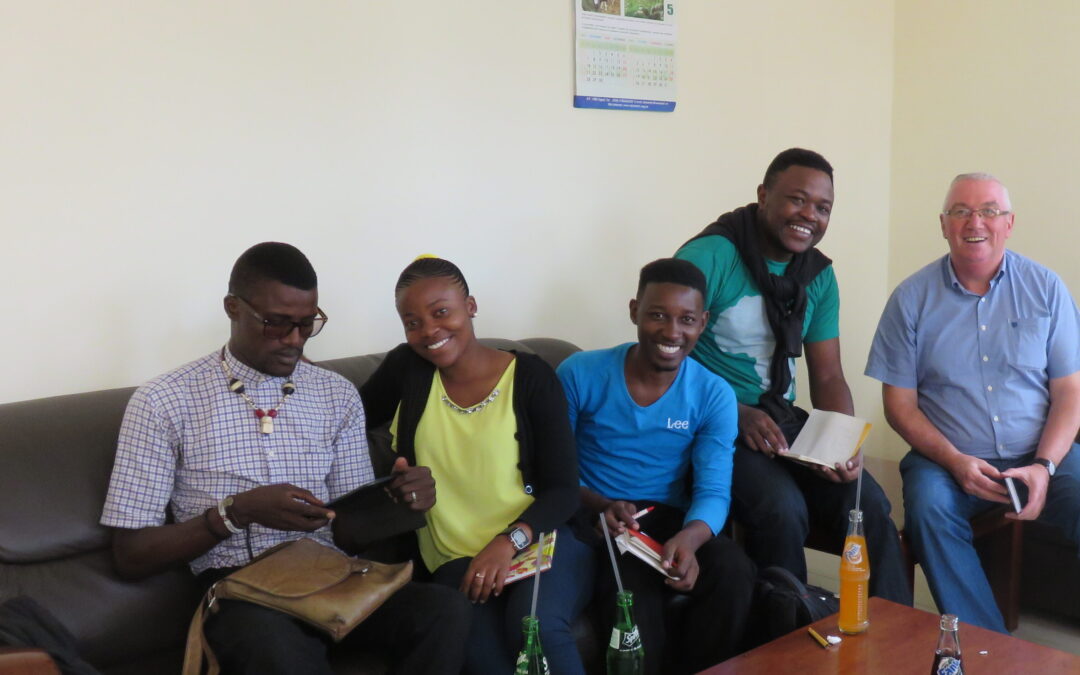
20 Sep 2019 | Non categorizzato
Koen Vanreusel, a Belgian businessman who works for the Economy of Communion says: “We need collaboration between different generations in the business world.” 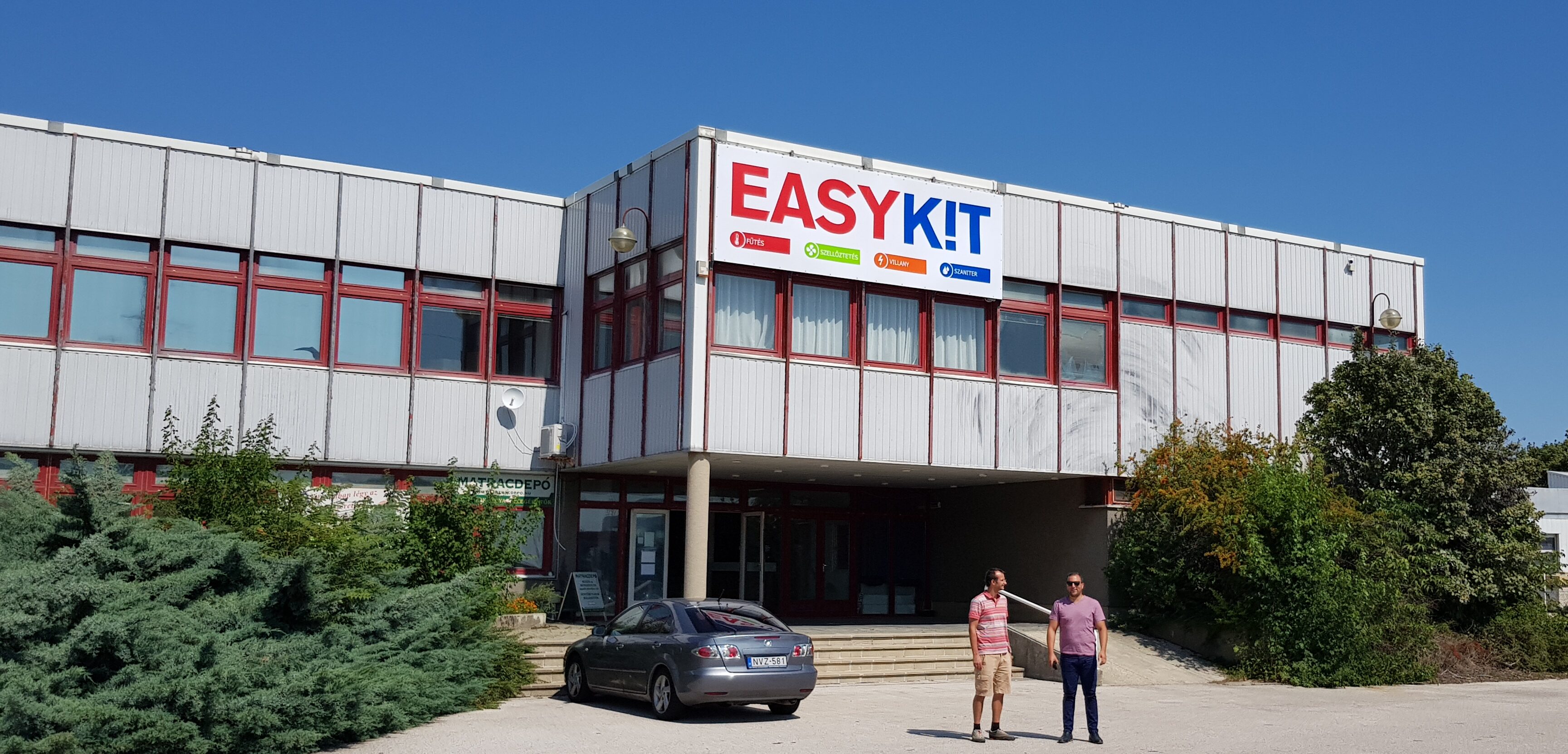 “We need young people to open up new ways of working; we older people are happy to support them through our work and by sharing what we have and what we know.” This is what Koen Vanreusel said when he spoke about his commitment to young business men and women all over the world. Koen has 4 children and 9 grandchildren and is the managing director of “Easykit”, a Belgian company which employs 100 people. His views stem from the fact he follows the principles of the Economy of Communion (EoC) and are the reason why he will be visiting Assisi, Italy, from March 26-28 2020 for “The Economy of Francis” gathering. This event was initiated by Pope Francis for young economists and business men and women from all over the world. Koen, how do the principles of the Economy of Communion inspire your work? The Economy of Communion is the fruit of the “culture of giving” which began within the Focolare Movement. Its roots lie within the Gospel, where it says “Give and it will be given to you” (Lk 6:36-38). This gives rise to a new economy – more specifically, an economy of communion. Practically, as regards my company, this means putting the person at the centre of the work and respecting each person’s dignity: with our employees we try to create a family, a community. We have nine stores in different places and we are always careful to create a good relationship with all the employees. In addition, joining the EoC means donating a part of the company’s profits each year to those in need and thus making a contribution to combating world poverty. What difficulties do you encounter in living the Economy of Communion at work and how do you overcome them? We are a company the same as any other on the market and we face the same difficulties. But when we have problems, we try to create an atmosphere in which we can talk to colleagues and management about the situation. I also find that it is important to share these experiences with other entrepreneurs who are followers of the EoC. When we meet, there is always a great sense of trust and so we talk about the difficulties and together we try to see what opportunities there are. How do you try to involve your employees in living the “culture of giving”? Our employees know that we share the company’s profits with the poor: we provide them with information about the support that the company is giving to others so that they too can feel involved. In addition, at the end of the year, when calculating profits to be shared with those in need, the employees receive a percentage and can decide to what they will donate this money. In this way, they participate in the allocation of the company’s profits. We also try to be role models and set an example by contributing something extra at work beyond the call of duty, by doing something free for a colleague or supplier and by showing that this also gives great joy. How did you come up with the idea of supporting businesses that have been started by young people both in European countries and on other continents?
“We need young people to open up new ways of working; we older people are happy to support them through our work and by sharing what we have and what we know.” This is what Koen Vanreusel said when he spoke about his commitment to young business men and women all over the world. Koen has 4 children and 9 grandchildren and is the managing director of “Easykit”, a Belgian company which employs 100 people. His views stem from the fact he follows the principles of the Economy of Communion (EoC) and are the reason why he will be visiting Assisi, Italy, from March 26-28 2020 for “The Economy of Francis” gathering. This event was initiated by Pope Francis for young economists and business men and women from all over the world. Koen, how do the principles of the Economy of Communion inspire your work? The Economy of Communion is the fruit of the “culture of giving” which began within the Focolare Movement. Its roots lie within the Gospel, where it says “Give and it will be given to you” (Lk 6:36-38). This gives rise to a new economy – more specifically, an economy of communion. Practically, as regards my company, this means putting the person at the centre of the work and respecting each person’s dignity: with our employees we try to create a family, a community. We have nine stores in different places and we are always careful to create a good relationship with all the employees. In addition, joining the EoC means donating a part of the company’s profits each year to those in need and thus making a contribution to combating world poverty. What difficulties do you encounter in living the Economy of Communion at work and how do you overcome them? We are a company the same as any other on the market and we face the same difficulties. But when we have problems, we try to create an atmosphere in which we can talk to colleagues and management about the situation. I also find that it is important to share these experiences with other entrepreneurs who are followers of the EoC. When we meet, there is always a great sense of trust and so we talk about the difficulties and together we try to see what opportunities there are. How do you try to involve your employees in living the “culture of giving”? Our employees know that we share the company’s profits with the poor: we provide them with information about the support that the company is giving to others so that they too can feel involved. In addition, at the end of the year, when calculating profits to be shared with those in need, the employees receive a percentage and can decide to what they will donate this money. In this way, they participate in the allocation of the company’s profits. We also try to be role models and set an example by contributing something extra at work beyond the call of duty, by doing something free for a colleague or supplier and by showing that this also gives great joy. How did you come up with the idea of supporting businesses that have been started by young people both in European countries and on other continents? 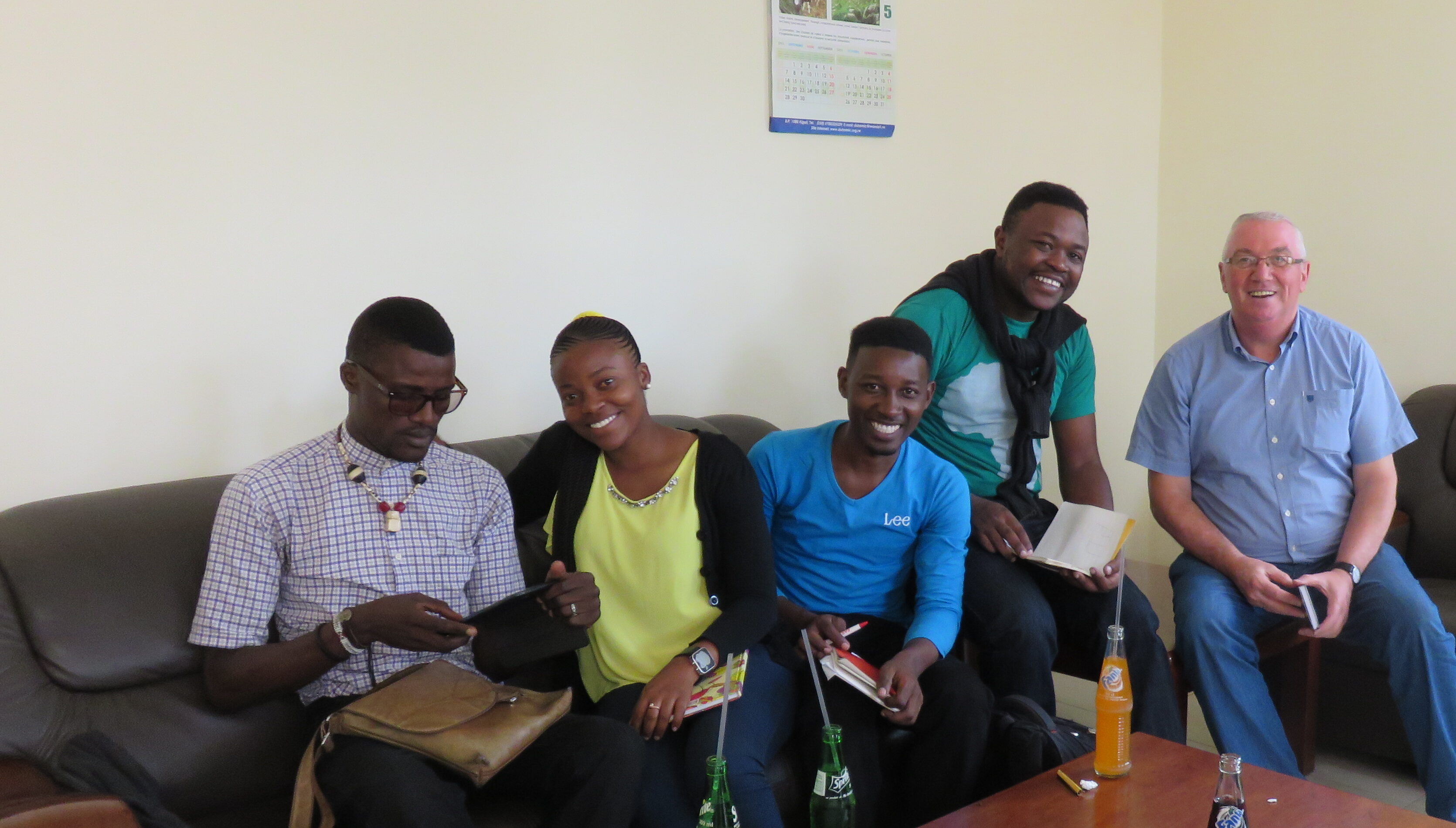 During one of the annual meetings of European EoC managers, we met young people from Serbia and Hungary who showed great appreciation for our business model and so we decided to share it with them. We supported them when they started a company in one of their own countries and continued to do so as the enterprise developed: we are very happy that this involvement means that we can share knowledge and our way of working. Then, during the EoC international meeting in Nairobi, Kenya, we met a group of young Congolese entrepreneurs who were determined not to abandon their war torn country but to stay and help people in need by starting a company. We felt we wanted to remain in contact with these young people and accompany them in their experience by offering them our skills. We want new generations of business men and women to join the Economy of Communion. What effects could the EoC paradigm have if applied on a large scale? It can help to build a fairer society with a smaller gap between rich and poor and a lower rate of poverty. By working together we can discover that a better world is possible. We will tell you about it in October, in Brussels, on a day dedicated to this very topic.
During one of the annual meetings of European EoC managers, we met young people from Serbia and Hungary who showed great appreciation for our business model and so we decided to share it with them. We supported them when they started a company in one of their own countries and continued to do so as the enterprise developed: we are very happy that this involvement means that we can share knowledge and our way of working. Then, during the EoC international meeting in Nairobi, Kenya, we met a group of young Congolese entrepreneurs who were determined not to abandon their war torn country but to stay and help people in need by starting a company. We felt we wanted to remain in contact with these young people and accompany them in their experience by offering them our skills. We want new generations of business men and women to join the Economy of Communion. What effects could the EoC paradigm have if applied on a large scale? It can help to build a fairer society with a smaller gap between rich and poor and a lower rate of poverty. By working together we can discover that a better world is possible. We will tell you about it in October, in Brussels, on a day dedicated to this very topic.
Claudia Di Lorenzi
18 Sep 2019 | Non categorizzato
The Gospel makes the seed of goodness that God placed in every human heart sprout. It is a seed a hope that grows with each personal daily encounter with God’s love, flourishing with the love we have for each other. It spurs us to fight against the bad seeds of individualism and indifference, which cause isolation and conflict, and to carry each other’s burdens and encourage each other. Inheritance After our parents died, my sister and I – we’re both married – began to have misunderstandings about our inheritance, which we felt was not distributed correctly. It got to the point that we became enemies. It seemed so absurd to me, yet that’s the way it was. I gathered the courage and went to visit her. She was surprised, and happy enough to hug me. After each of us asked each other’s forgiveness, we decided to take our mother’s jewels that we had received and donate them to a charity. After that we felt free: generosity towards others had brought us closer to each other, and we also felt closer to our parents in paradise. (F., France) Whatever I have extra isn’t mine Some time ago, when we used to spend the night at a migrant centre, early one morning Gabriele and I, after spending the night there, accompanied a priest and some teens who had been guests to the door. They were leaving to get their documentation. It was cold, and we were dressed for it, but one of the teens only had a light T-shirt on. I asked him if he was cold but realised from the look he gave me that he could not understand my question. So I took off my coat (I had a heavy jumper underneath) and gave it to him. Gabriele gave him some money to buy something during the day. I got back home with a great joy in my heart. At home, my wife told me that for a while her sister wanted to give me a gift, and she had chosen a coat. (Rosario, Italy) Children of God Like most mornings, getting on the subway full of all kinds of people, who as usual were planning on reading or busy with their smartphones, I felt a sense of pain and sadness. Do they know what to live for? Do they have an ideal in life? But then I thought, each of them will have had hardship in life, and perhaps right now one of them is suffering with something… And I began to see them differently: no longer as poor people, but as children of God, who loves and supports each of them. (T., Italy) Sharing I was at university for an exam when I saw that an accountant had come looking for a student who had not paid his student fees. Seeing that right then I had some money in my pocket, I asked that student if I could pay for him. From that moment on, we were friends. Getting to know him better, I learned that he was an orphan who had lost both his parents and looking for some work to pay for university accommodation. I shared his need with other friends, and we committed to helping him both economically and spiritually. (Steve, Burundi)
Chiara Favotti

 After more than fifty years of life theirs is an artistic proposition capable of continuous renewal. At the same time, they keep the compass fixed on some key points: a life lived under the banner of fraternity, a collaborative production between artists of various nationalities that speaks of unity between peoples and nations, a message that proposes a culture of giving and sharing – attentive to the challenges of our planet. This is Gen Rosso an international music group, made up of musicians and technicians of different vocations from Europe, Asia and Latin America. Recently their “Life” tour became an album with eighteen tracks chosen from the songs recorded by Gen Rosso over the years. We talk about it with one of the group, Michele Sole. – On July 1st your live album from the “LIFE” Tour was released. How was this new album conceived and what are its characteristics? From the autumn of 2018 until today we have had some beautiful concerts all over Italy with our production “LIFE” and since the audiences were enthusiastic, like we were ourselves, from there we had the desire to create a cd ‘Life – live’. Once the recordings made on stage were re-created, we mixed them trying to keep all the energy and emotion that we breathe in our concerts. You can hear the audience singing with us, their applause and their voices, giving the listener the feeling of being right there with us on stage. In short, a real live recording! –
After more than fifty years of life theirs is an artistic proposition capable of continuous renewal. At the same time, they keep the compass fixed on some key points: a life lived under the banner of fraternity, a collaborative production between artists of various nationalities that speaks of unity between peoples and nations, a message that proposes a culture of giving and sharing – attentive to the challenges of our planet. This is Gen Rosso an international music group, made up of musicians and technicians of different vocations from Europe, Asia and Latin America. Recently their “Life” tour became an album with eighteen tracks chosen from the songs recorded by Gen Rosso over the years. We talk about it with one of the group, Michele Sole. – On July 1st your live album from the “LIFE” Tour was released. How was this new album conceived and what are its characteristics? From the autumn of 2018 until today we have had some beautiful concerts all over Italy with our production “LIFE” and since the audiences were enthusiastic, like we were ourselves, from there we had the desire to create a cd ‘Life – live’. Once the recordings made on stage were re-created, we mixed them trying to keep all the energy and emotion that we breathe in our concerts. You can hear the audience singing with us, their applause and their voices, giving the listener the feeling of being right there with us on stage. In short, a real live recording! –  Recently you have created, in the international little town of Loppiano where you are based the “Gen Rosso Music and Arts Village”. What is this and what are the objectives? The “Gen Rosso Music and Arts Village” will be held this year from December 27th 2019 until January 5th 2020, this will be the third edition. It is an artistic experience, the sharing of values from the perspective of the charism of unity. It involves young professionals and students, aged 18 and above, from different disciplines such as music, dance, singing, theatre. The teaching methodology is designed by Gen Rosso tutors together with teachers who have recognized artistic skills and experience. The program includes an in-depth study of specific themes from the art world, the exchange of experiences, creative spaces and practical workshops that will converge in a final performance. You can register at village@genrosso.com. The programme will start on December 27th 2019 and will end on January 5th 2020.
Recently you have created, in the international little town of Loppiano where you are based the “Gen Rosso Music and Arts Village”. What is this and what are the objectives? The “Gen Rosso Music and Arts Village” will be held this year from December 27th 2019 until January 5th 2020, this will be the third edition. It is an artistic experience, the sharing of values from the perspective of the charism of unity. It involves young professionals and students, aged 18 and above, from different disciplines such as music, dance, singing, theatre. The teaching methodology is designed by Gen Rosso tutors together with teachers who have recognized artistic skills and experience. The program includes an in-depth study of specific themes from the art world, the exchange of experiences, creative spaces and practical workshops that will converge in a final performance. You can register at village@genrosso.com. The programme will start on December 27th 2019 and will end on January 5th 2020.  – In your travels, you participate in events that promote peace and friendship between peoples and universal fraternity. Is there a recent one that you remember in particular and why? Yes, in the spring we had the joy of being in Jordan, thanks to “Caritas Jordan”, to carry out the project “Be the change” . We worked with hundreds of students from different social classes, different religions and different nationalities, It is a project to foster dialogue and promote a culture of peace and friendship, with the participants themselves being the promoters of a change in their lives and in their cities for a better future. – What are your plans and future appointments? First of all, we will resume the world tour with the concert “Life” along with educational projects and the inclusion on stage of young people prepared during various workshops. The tour will begin in Italy (September 28th in Venosa; October 12th in Piacenza; October 23rd and 24th in Acerra; October 26th in Prato, November 1st in Teano). Then an Asian tour in Indonesia for almost the entire month of November 2019.
– In your travels, you participate in events that promote peace and friendship between peoples and universal fraternity. Is there a recent one that you remember in particular and why? Yes, in the spring we had the joy of being in Jordan, thanks to “Caritas Jordan”, to carry out the project “Be the change” . We worked with hundreds of students from different social classes, different religions and different nationalities, It is a project to foster dialogue and promote a culture of peace and friendship, with the participants themselves being the promoters of a change in their lives and in their cities for a better future. – What are your plans and future appointments? First of all, we will resume the world tour with the concert “Life” along with educational projects and the inclusion on stage of young people prepared during various workshops. The tour will begin in Italy (September 28th in Venosa; October 12th in Piacenza; October 23rd and 24th in Acerra; October 26th in Prato, November 1st in Teano). Then an Asian tour in Indonesia for almost the entire month of November 2019.  Meanwhile, we will continue with courses in the little town of Loppiano, sharing experiences, training and art. From October 15th to 17th we will examine in depth light design, a course intended for people interested in expanding their knowledge of the use of light and colour. In addition, to support young emerging artists, we have started co-productions. The first is Stabat in Silentium, the staging of a play by the young writer Francesco Bertolini. This play is the result of a profound experience of solidarity that emerged after the earthquake in Amatrice (Italy). “How can one still believe in God after an earthquake?” is the “uncomfortable” question which is the starting point of this work. The protagonists are the young victims, but also the volunteers who leave their quiet life to go where tragedy has occurred.
Meanwhile, we will continue with courses in the little town of Loppiano, sharing experiences, training and art. From October 15th to 17th we will examine in depth light design, a course intended for people interested in expanding their knowledge of the use of light and colour. In addition, to support young emerging artists, we have started co-productions. The first is Stabat in Silentium, the staging of a play by the young writer Francesco Bertolini. This play is the result of a profound experience of solidarity that emerged after the earthquake in Amatrice (Italy). “How can one still believe in God after an earthquake?” is the “uncomfortable” question which is the starting point of this work. The protagonists are the young victims, but also the volunteers who leave their quiet life to go where tragedy has occurred. 

 “Better Together” was the catchphrase that guided them. The programme was sponsored by
“Better Together” was the catchphrase that guided them. The programme was sponsored by  “We talked about what we mean by a ‘united world’, what peace, human rights are, and as a result what we mean by ‘person’”, explained Marco Desalvo, the NGO’s president. “We made an effort to translate all the best practices that our young people promote each day in the world, into a language that can inspire the international institutions, to spread the spirit of universal fraternity in every area of society at every level, just as the Universal Declaration of Human Rights proclaims.” The young ambassadors were welcomed by UNESCO officials from the humanities and social sciences (youth branch) and the education sector (global citizenship and culture of peace). “An open and free dialogue sprang up, allowing these delegates to discover New Humanity’s activities in a better way, through experiences from the young ambassadors, who were able to act as one, seeing all they had learned in recent days and their positive experiences of global citizenship,” added Grevin. Each young person was given the possibility of personally meeting the UNESCO delegate from their country and express their vision regarding the huge challenges of peace, the environment and fraternity.
“We talked about what we mean by a ‘united world’, what peace, human rights are, and as a result what we mean by ‘person’”, explained Marco Desalvo, the NGO’s president. “We made an effort to translate all the best practices that our young people promote each day in the world, into a language that can inspire the international institutions, to spread the spirit of universal fraternity in every area of society at every level, just as the Universal Declaration of Human Rights proclaims.” The young ambassadors were welcomed by UNESCO officials from the humanities and social sciences (youth branch) and the education sector (global citizenship and culture of peace). “An open and free dialogue sprang up, allowing these delegates to discover New Humanity’s activities in a better way, through experiences from the young ambassadors, who were able to act as one, seeing all they had learned in recent days and their positive experiences of global citizenship,” added Grevin. Each young person was given the possibility of personally meeting the UNESCO delegate from their country and express their vision regarding the huge challenges of peace, the environment and fraternity.  During the training course, the young people also had the opportunity to meet and speak with Monsignor Follo, a permanent observer to the Holy See, and Marie Claude Machon, Philippe Beaussant and Patrick Gallaud, who are the president, vice president and ex-president respectively of the liaison committee between NGOs and UNESCO. “Thanks to this course I learned so much about the United Nations system and NGO activities worldwide”, said Luciana, an Italian lawyer, at the conclusion of the experience. “Yet above all I rediscovered the true motivators that drove me towards this world. As an ambassador of New Humanity, I would like to promote the idea that supporting each other can make a great difference in creating a more united world. I understood that small
During the training course, the young people also had the opportunity to meet and speak with Monsignor Follo, a permanent observer to the Holy See, and Marie Claude Machon, Philippe Beaussant and Patrick Gallaud, who are the president, vice president and ex-president respectively of the liaison committee between NGOs and UNESCO. “Thanks to this course I learned so much about the United Nations system and NGO activities worldwide”, said Luciana, an Italian lawyer, at the conclusion of the experience. “Yet above all I rediscovered the true motivators that drove me towards this world. As an ambassador of New Humanity, I would like to promote the idea that supporting each other can make a great difference in creating a more united world. I understood that small  gestures can have a great impact on people’s wellbeing. This is why I feel so privileged to be a part of this fantastic project!” Pascal, who is Lebanese, shared: “When I first arrived, I was discouraged at not being able to find solutions for my own country. Then I found courage and hope, and I understood that we can persevere, we can truly work to reach a united world. I know it will happen! I am quite happy to be going back to my country and start working.” And Noè, from Mexico, said: “I arrived here with my friend Josef from the U.S. We live just a few kilometres from the border separating our countries. We are already working together on projects to help migrants. When we go back, we’ll be able to put into practice what we learned here.”
gestures can have a great impact on people’s wellbeing. This is why I feel so privileged to be a part of this fantastic project!” Pascal, who is Lebanese, shared: “When I first arrived, I was discouraged at not being able to find solutions for my own country. Then I found courage and hope, and I understood that we can persevere, we can truly work to reach a united world. I know it will happen! I am quite happy to be going back to my country and start working.” And Noè, from Mexico, said: “I arrived here with my friend Josef from the U.S. We live just a few kilometres from the border separating our countries. We are already working together on projects to help migrants. When we go back, we’ll be able to put into practice what we learned here.” 
 The Ministry of Education, University and Research (Italy) announced the national competition, open to Junior and Senior High Schools, on their website https://www.miur.gov.it/competizioni-e-concorsi-per-studenti highlighting the theme: “One city is not enough”. Chiara Lubich, Citizen of the World To discover her illustrious figure, her commitment and life witness on the occasion of the CENTENARY OF HER BIRTH with the aim of building Unity and Fraternity among peoples The competition is being promoted by the Chiara Lubich/New Humanity Centre and by the Trentino Historical Museum Foundation, in collaboration with the Ministry of Education, University Studies & Research, as part of the centenary celebrations of Chiara Lubich’s birth. Who is it for? It is aimed at students of all Italian junior and senior high schools whose participation consists of writing a paper (in the form of written text or a multimedia presentation) on one of the following topics: – Chiara Lubich in the context of the Second World War – Chiara Lubich and the collapse of the Berlin Wall – Chiara Lubich “Citizen of the World”, in dialogue with peoples and cultures In addition – and this is the fourth thematic area – students can narrate positive experiences they have personally lived, thus documenting chronicles that are of a positive nature, inspired by the message conveyed by Lubich’s writings. What are the aims of the competition? The competition aims to develop a spirit of initiative by creating situations of didactic conflict by writers still unexplored by standard textbooks; it aims to make Chiara Lubich known as a significant protagonist of the twentieth century through a profound understanding of her vision of “a united world”; it also aims to accompany new generations in their active pursuit of paths of peace and brotherhood between different cultures, languages, religions and peoples.
The Ministry of Education, University and Research (Italy) announced the national competition, open to Junior and Senior High Schools, on their website https://www.miur.gov.it/competizioni-e-concorsi-per-studenti highlighting the theme: “One city is not enough”. Chiara Lubich, Citizen of the World To discover her illustrious figure, her commitment and life witness on the occasion of the CENTENARY OF HER BIRTH with the aim of building Unity and Fraternity among peoples The competition is being promoted by the Chiara Lubich/New Humanity Centre and by the Trentino Historical Museum Foundation, in collaboration with the Ministry of Education, University Studies & Research, as part of the centenary celebrations of Chiara Lubich’s birth. Who is it for? It is aimed at students of all Italian junior and senior high schools whose participation consists of writing a paper (in the form of written text or a multimedia presentation) on one of the following topics: – Chiara Lubich in the context of the Second World War – Chiara Lubich and the collapse of the Berlin Wall – Chiara Lubich “Citizen of the World”, in dialogue with peoples and cultures In addition – and this is the fourth thematic area – students can narrate positive experiences they have personally lived, thus documenting chronicles that are of a positive nature, inspired by the message conveyed by Lubich’s writings. What are the aims of the competition? The competition aims to develop a spirit of initiative by creating situations of didactic conflict by writers still unexplored by standard textbooks; it aims to make Chiara Lubich known as a significant protagonist of the twentieth century through a profound understanding of her vision of “a united world”; it also aims to accompany new generations in their active pursuit of paths of peace and brotherhood between different cultures, languages, religions and peoples.  What resources are available to discuss the proposed topics? Chiara Lubich is quite a well-known figure, however, both teachers and students are free to contact the Chiara Lubich Centre by leaving a message on their website or by writing to: concorso.studenti@centrochiaralubich.org The Trentino Historical Museum Foundation will also inaugurate an international multimedia exhibition entitled “Chiara Lubich World City” (opening from 7 December 2019 until November 2020), which will include specific tours for schools. What are the terms and conditions for participating in the competition? Works that are strictly unpublished must be received by 31 March 2020. The competition announcement gives precise indications on the way the projects may be transmitted. The evaluation commission will be composed of members of the Ministry of Education, University Studies & Research, the Chiara Lubich/New Humanity Centre and the Trentino Historical Museum Foundation. How will the awards be conferred? Awards will be presented to the winning schools during an official ceremony to be held by the end of the 2019-2020 school year, most probably in Rome.
What resources are available to discuss the proposed topics? Chiara Lubich is quite a well-known figure, however, both teachers and students are free to contact the Chiara Lubich Centre by leaving a message on their website or by writing to: concorso.studenti@centrochiaralubich.org The Trentino Historical Museum Foundation will also inaugurate an international multimedia exhibition entitled “Chiara Lubich World City” (opening from 7 December 2019 until November 2020), which will include specific tours for schools. What are the terms and conditions for participating in the competition? Works that are strictly unpublished must be received by 31 March 2020. The competition announcement gives precise indications on the way the projects may be transmitted. The evaluation commission will be composed of members of the Ministry of Education, University Studies & Research, the Chiara Lubich/New Humanity Centre and the Trentino Historical Museum Foundation. How will the awards be conferred? Awards will be presented to the winning schools during an official ceremony to be held by the end of the 2019-2020 school year, most probably in Rome. 
 “We need young people to open up new ways of working; we older people are happy to support them through our work and by sharing what we have and what we know.” This is what Koen Vanreusel said when he spoke about his commitment to young business men and women all over the world. Koen has 4 children and 9 grandchildren and is the managing director of
“We need young people to open up new ways of working; we older people are happy to support them through our work and by sharing what we have and what we know.” This is what Koen Vanreusel said when he spoke about his commitment to young business men and women all over the world. Koen has 4 children and 9 grandchildren and is the managing director of  During one of the annual meetings of European EoC managers, we met young people from Serbia and Hungary who showed great appreciation for our business model and so we decided to share it with them. We supported them when they started a company in one of their own countries and continued to do so as the enterprise developed: we are very happy that this involvement means that we can share knowledge and our way of working. Then, during the EoC international meeting in Nairobi, Kenya, we met a group of young Congolese entrepreneurs who were determined not to abandon their war torn country but to stay and help people in need by starting a company. We felt we wanted to remain in contact with these young people and accompany them in their experience by offering them our skills. We want new generations of business men and women to join the Economy of Communion. What effects could the EoC paradigm have if applied on a large scale? It can help to build a fairer society with a smaller gap between rich and poor and a lower rate of poverty. By working together we can discover that a better world is possible. We will tell you about it in October, in Brussels, on a day dedicated to this very topic.
During one of the annual meetings of European EoC managers, we met young people from Serbia and Hungary who showed great appreciation for our business model and so we decided to share it with them. We supported them when they started a company in one of their own countries and continued to do so as the enterprise developed: we are very happy that this involvement means that we can share knowledge and our way of working. Then, during the EoC international meeting in Nairobi, Kenya, we met a group of young Congolese entrepreneurs who were determined not to abandon their war torn country but to stay and help people in need by starting a company. We felt we wanted to remain in contact with these young people and accompany them in their experience by offering them our skills. We want new generations of business men and women to join the Economy of Communion. What effects could the EoC paradigm have if applied on a large scale? It can help to build a fairer society with a smaller gap between rich and poor and a lower rate of poverty. By working together we can discover that a better world is possible. We will tell you about it in October, in Brussels, on a day dedicated to this very topic.